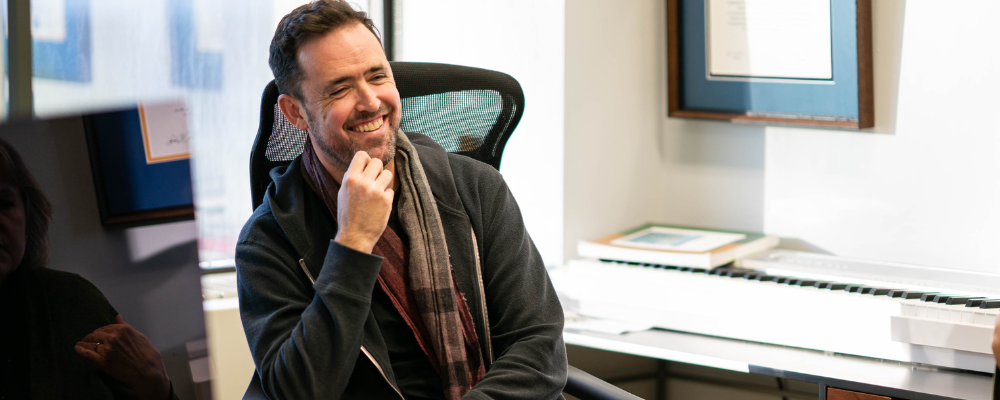Graduate Composition

The Department of Music at Stony Brook offers the MA and PhD degrees in Music Composition. The championship of new music runs deep in the department, with a consistently large contingent of faculty composers and performance faculty who have been in the forefront of new music commissioning since the department’s inception in the late 1960’s.
Students are admitted to the graduate program in a competitive process on the basis of promising individual voices that are developed through weekly composition lessons. Students develop their compositional art and craft against the backdrop of course requirements informed by Western art music traditions [see curricular requirements here.] Our six faculty composers embrace a broad spectrum of compositional styles and philosophies and support the varied creative trajectories of admitted students as they evolve during their time in the composition program.
The MA and PhD are full-time programs that have 2- to 3-year residential requirements, and students actively participate in the extensive activities of the program by attending concerts, rehearsals, regular faculty and guest composer colloquia, and a weekly Composers Forum. Student works are presented on new music concerts by the Stony Brook Contemporary Chamber players, called by the New York Times “a small army of musicians who demonstrate consistent accomplishment.” Every semester, the Stony Brook Symphony Orchestra reads graduate compositions for orchestra and our opera program performs scenes from student works. One of the principal advantages of studying at Stony Brook is access to the large graduate performance program of almost 200 student musicians, most of whom study for the DMA degree. Many performers have gone on to form new music groups such as the New Millennium Ensemble, Sputterbox, Unheard-of Ensemble, and Yarn/Wire. Additional performances by performers in a variety of genres are mounted by the Staller Center, the professional arts organization on campus. New York City, 55 miles to the west and accessible by a train with a campus station, further provides a stimulating cultural environment and opportunities for performance.
It is our mission to prepare for their professional careers post graduation, not only through the continued development and refinement of their compositional practice, but also by providing a solid foundation in Western art music and experience in teaching and other administrative activities. Many students in the graduate composition program receive tuition scholarships and assistantships to teach their own classes in music theory, musicianship, computer music, and composition under the supervision of faculty mentors. They are ready upon graduation to take their place as faculty at fine institutions in the U.S. and abroad. Former graduate students have faculty appointments at Bard College, Brandeis University, the Cleveland Institute of Music, Crane School of Music, New York University, Northwestern University, the University of Washington, among many others, and abroad in institutions in Israel, Spain, Finland, Hong Kong, and Lebanon. Other graduates have gone on to successful non-academic professional careers, in publishing houses, music venues, and non-profit arts organizations.
Composition Faculty
Matthew Barnson, Composition, Theory & Musicianship
Nirmali Fenn, Composition, Theory & Musicianship
Perry Goldstein, Composition, Theory & Musicianship
Margaret Schedel, Composition, Computer Music & Theory
Daria Semegen, Composition, Theory & Electronic Music
Daniel Weymouth, Composition, Computer Music & Theory
Graduate Studies in Composition
The Master Of Arts in Music (Composition)
The capstone of the MA in Composition is a composition portfolio. Preparation for this includes a grounding in Western classical theory (musicianship, counterpoint, and analysis), music technology, orchestration, specialized composition topics courses, and participation in weekly Composers Forum meetings. A principal aspect of training is weekly composition lessons. We operate on an “open studio” model: students have the option of studying with several teachers over the course of their study.
In the second year, in addition to submission of the composition portfolio, students take a qualifying exam in analysis of tonal and post-tonal music.
The PhD in Music (Composition)
In the first year of study, PhD students are assigned a faculty committee, to determine with them an appropriate course of study that takes into account prior coursework and student interest. Students create works for a PhD portfolio.
Prior to advancing to candidacy (normally after two or three years in the program), composition students submit their PhD portfolio, take a field exam covering “new music” from the last 100 years, present a PhD colloquium and submit a PhD essay, both on topics in 20th and 21st Century music of their choice.
The thesis for the PhD in Composition is a substantial creative work.
Application Process
For information on application requirements and the deadline, see our Apply page.
